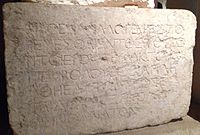
The warning in the Jerusalem Temple
source: http://en.wikipedia.org/wiki/Temple_Warning_inscription
Let not the foreigner who has joined himself to the Lord say, “The Lord will surely separate me from his people”; and let not the eunuch say, “Behold, I am a dry tree.” For thus says the Lord: “To the eunuchs who keep my Sabbaths, who choose the things that please me and hold fast my covenant, I will give in my house and within my walls a monument and a name better than sons and daughters; I will give them an everlasting name that shall not be cut off. “And the foreigners who join themselves to the Lord, to minister to him, to love the name of the Lord, and to be his servants, everyone who keeps the Sabbath and does not profane it, and holds fast my covenant—these I will bring to my holy mountain, and make them joyful in my house of prayer; their burnt offerings and their sacrifices will be accepted on my altar; for my house shall be called a house of prayer for all peoples.” The Lord God, who gathers the outcasts of Israel, declares, “I will gather yet others to him besides those already gathered.”
This passage in Isaiah probably accounts for the biggest “whoa, I didn’t know that was there!” discovery I ever had in the Bible. Along with many, I made the assumption that the Old Testament standard was pretty exclusive to the Jews, and that the extension of God’s grace to Gentiles was an innovation of the New Testament church. Obviously, that’s ’cause I hadn’t been looking too closely; even Abraham was to father a people through whom “all the nations” would be blessed (Gen. 22:18). But this Isaiah passage is still huge. Eunuchs were explicitly excluded from God’s sanctuary (Deut. 23:1), and while the law provided for the foreigner to be included, even up to Jesus’ time actual practice forbade it.
In fact, Herod’s temple included an explicit warning that foreigners must stay out upon penalty of death. (see http://en.wikipedia.org/wiki/Temple_Warning_inscription for details). I wonder if perhaps when Jesus quoted this Isaiah passage himself at the cleansing of the temple (Matt. 21:13), he may not have been calling out, not only the money-grubbing, but also this hostile dividing of nations.
At any rate, this prophecy from over 700 years before Jesus’ birth, is a lesson to all of us that God’s intention always was inclusion of the outcast — even the outcast who was called out in God’s own law. I wonder if perhaps that lesson might apply to our culture wars even today.
